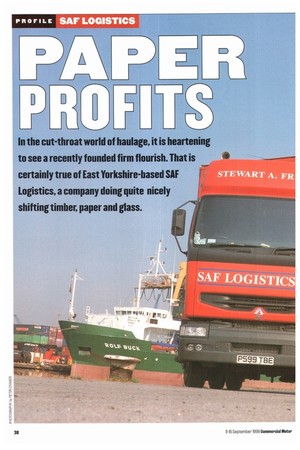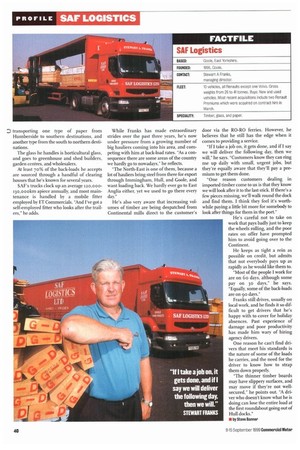In the cut-throat world of haulage, it is heartening to
Page 40

Page 41

Page 42

If you've noticed an error in this article please click here to report it so we can fix it.
see a recently founded firm flourish. That is certainly true of East Yorkshire-based SAF Logistics, a company doing quite nicely shifting timber, paper and glass.
ith transport operators going out of business right, left and centre, thanks to the huge and unfair tax burden slapped on diesel by the Government, it is encouraging to meet one haulier who is still expanding quickly and profitably.
Stewart A Franks established SAF Logistics with a second-hand Renault R34o tractor unit in October 1996, and now runs iv vehicles. Based at the port of Goole in East Yorkshire, he specialises in moving glass, timber, and paper.
A former bridge engineer with British Railways, Franks subsequently worked as transport manager for a Humberside-based warehousing and shipping company. He set up on his own when the company made him redundant.
Why go into haulage, initially as an ownerdriver, given the intense competition and cutthroat raies?
/1 didn't think there was anything else in the area that would give me the sort of remuneration
that I'd been getting," be replies. "And my redundancy package helped me survive for the first six or eight months without having to pay myself anything."
As well as doing all the driving he worked hard at developing his little business, using the contacts he'd built up in his previous occupation; mainly in the timber industry "I was soon swamped with work," he says. Initially operating as a subcontractor, he increasingly found he was working directly for clients.
Something that was of major benefit to him in the early months was the support he received from Thompson Freight Services. He hauled paper for TFS out of Immingham docks, and the firm made sure they sent him to places where he could pick up back-loads bound for Goole.
Trailer-load
"If I wanted to be down in London, they would find me a trailer-load bound for London the following day," he says.
"The rates weren't particularly good, but it all fitted together because I was getting my own work to bring back."
He also received a lot of help from Renault dealer ET Commercials—"they picked out some decent second-hand vehicles for me"— Grahams of Gildersome, and Victor Finance. Finding finance companies that would back his expansion was a big challenge because he had no previous experience of running his own firm. But his knowledge of the transport industry, plus the fact that he was clearly picking up a lot of traffic, helped him..
Today he's operating a Volvo FFlia Globetrotter and three Renault Premiums at 41 tonnes, all 6x2s, a Renault Magnum, tw Premiums, and a Major at 38 tonnes, a 4X2S, and a Renault Premium 26-tonne sixwheeled rigid driven by his son Antony.
"My wife's brother and two of her drive for rue too," he adds.
"The 26-tanner is on contract Russian-based glass company taking glass over the country," he says. "It's got a 340h engine, and it's returning rimpg. The fie average is around 8mpg."
All the other Renaults are at 385hp apa from the 43ohp Mack-enginecl Magnum The Volvo is powered by a 38ohp D12. Major shunter completes the line-up. "It wa my first truck, it's done nearly 9 oo, 000k and it runs like a dream," Franks says keep it for sentimental reasons."
Paper in particular is dense but Franks get 25 tonnes on a 41-tonner compared to 23.5 tonnes on a 38-tonner.
Eleven of SAF's triaxle trailers are curtain. siders, one is a flat. Three of the curtainsiders were acquired earlier this year: they have Grahams of Gildersome bodies, Tinsley chassis, and BPW running gear incorporating lightweight air suspension and lowmaintenance ECO hubs.
"That should reduce servicing and downtime by up to 50%," Franks estimates.
The Humberside ports generate much of SAF's work. For example, Scandinavian timber goes into Goole and Hull, and Franks' trucks transport it to joinery manufacturers across Britain. Some of the paper comes in through ports in the South-East and he can find himself transporting one type of paper from Humberside to southern destinations, and another type from the south to northern destinations.
The glass he handles is horticultural glass, and goes to greenhouse and shed builders, garden centres, and wholesalers.
At least 70% of the back-loads he accepts are sourced through a handful of clearing houses that he's known for several years.
SAF's trucks clock up an average 120,00013o,000km apiece annually, and most maintenance is handled by a mobile fitter employed by ET Commercials. "And I've got a self-employed fitter who looks after the trailers," he adds.
While Franks has made extraordinary strides over the past three years, he's now under pressure from a growing number of big hauliers coming into his area, and competing with him at back-load rates. "As a consequence there are some areas of the country we hardly go to nowadays," he reflects.
"The North-East is one of them, because a lot of hauliers bring steel from there for export through Immingham, Hull, and Goole, and want loading back. We hardly ever go to East Anglia either, yet we used to go there every day."
He's also very aware that increasing volumes of timber are being despatched from Continental mills direct to the customer's door via the RO-RO ferries. However, he believes that he still has the edge when it comes to providing a service.
"If! take a job on, it gets done, and if I say we will deliver the following day, then we will," he says. "Customers know they can ring me up daily with small, urgent jobs, but they're equally aware that they'll pay a premium to get them done.
"One reason customers dealing in imported timber come to us is that they know we will look after it to the last stick. If there's a few pieces missing, we'll walk round the dock and find them. I think they feel it's worthwhile paying a little bit more for somebody to look after things for them in the port" He's careful not to take on work that pays badly just to keep the wheels rolling, and the poor rates on offer have prompted him to avoid going over to the Continent.
He keeps as tight a rein as possible on credit, but admits that not everybody pays up as rapidly as he would like them to.
"Most of the people I work for are on Go days, although some pay on 30 days," he says. "Equally, some of the back-loads are on 90 days."
Franks still drives, usually on local work, and he finds it so difficult to get drivers that he's happy with to cover for holiday absences. Past experience of damage and poor productivity has made him wary of hiring agency drivers.
One reason he can't find drivers that meet his standards is the nature of some of the loads he carries, and the need for the driver to know how to strap them down properly.
"The thinner timber boards may have slippery surfaces, and may move if they're not wellsecured," he points out. "A driver who doesn't know what he is doing can lose the entire load at the first roundabout going out of Hull docks."
• by Steve Banner












































































































